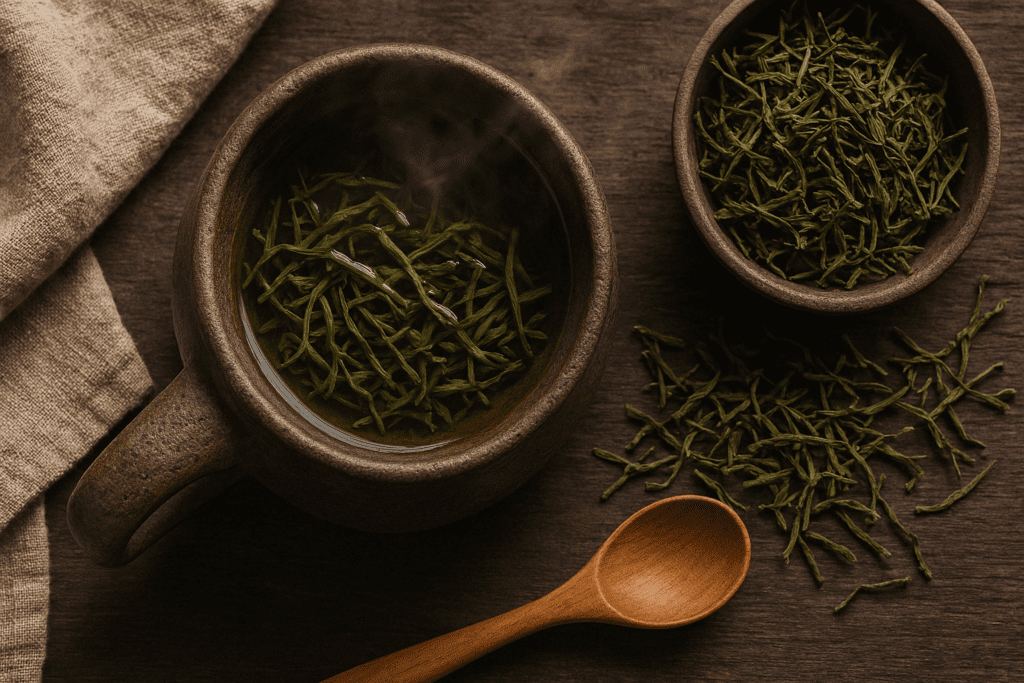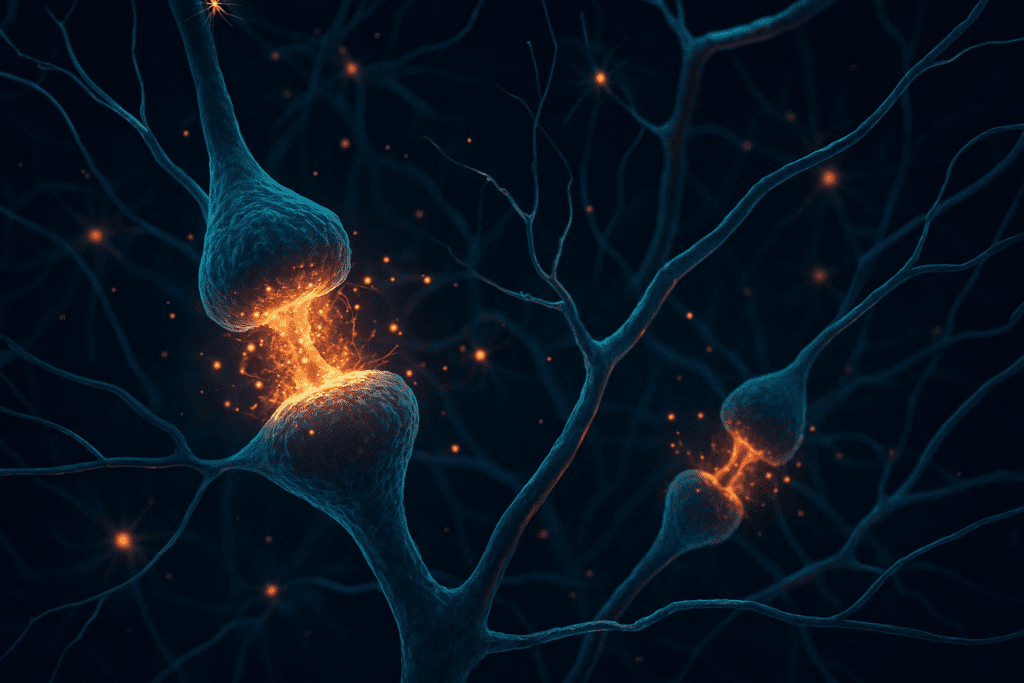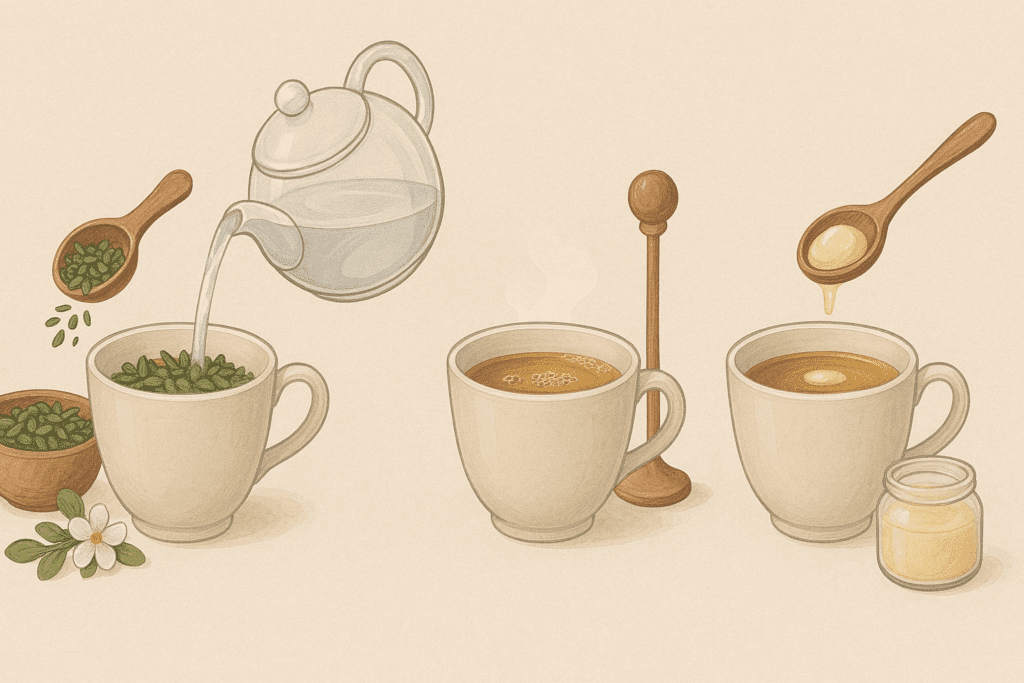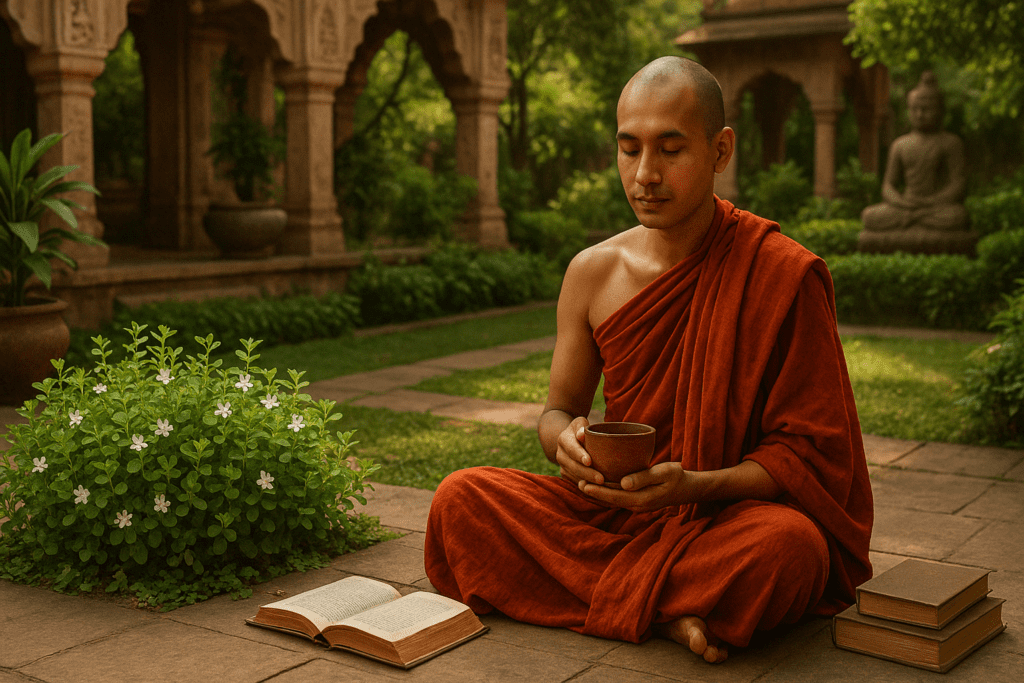Introduction: The Growing Interest in Herbal Cognitive Enhancers
As modern life demands an ever-increasing level of cognitive performance, individuals are seeking natural methods to support brain health and sharpen mental clarity. Among the plethora of herbal remedies explored, bacopa monnieri tea and brahmi tea have gained considerable attention. Revered for centuries in traditional Ayurvedic medicine, these botanicals are now being validated through scientific inquiry for their potential cognitive benefits. At a time when nootropics are growing in popularity, understanding how naturally derived options like bacopa monnieri tea and brahmi tea can fit into a holistic brain health strategy is more relevant than ever.
You may also like: Bacopa Monnieri Plant Benefits: How This Ancient Herb Supports Brain Health, Focus, and Memory Naturally”
These teas are not merely trends; they are backed by a long-standing history of use and an expanding body of research. Their active compounds suggest mechanisms that may promote neuroprotection, enhance memory formation, and mitigate cognitive decline. With increasing global awareness about the importance of maintaining mental agility across the lifespan, the role of bacopa monnieri tea and brahmi tea in cognitive wellness continues to be a subject of both scientific investigation and public fascination. This article delves deeply into these herbal teas’ histories, pharmacological properties, cognitive benefits, preparation methods, and practical applications, providing a comprehensive resource for those seeking natural cognitive support.

Understanding Bacopa Monnieri: An Ancient Herb for Modern Minds
Bacopa monnieri, often called “Brahmi” in the Ayurvedic tradition, is a perennial herb native to the wetlands of India and Southeast Asia. Historically celebrated for its memory-enhancing properties, bacopa monnieri has been used in Ayurvedic formulations for thousands of years. Its Sanskrit name “Brahmi” is derived from “Brahma,” the mythical creator in Hinduism, symbolizing the herb’s association with knowledge and intellect.
Modern research attributes the cognitive benefits of bacopa monnieri tea to its rich concentration of bioactive compounds known as bacosides. These molecules are thought to exert neuroprotective effects by enhancing synaptic communication, reducing oxidative stress, and modulating key neurotransmitter systems, particularly those related to learning and memory. Studies have indicated that regular consumption of bacopa monnieri may contribute to improvements in memory recall, attention span, and information processing speed.
What sets bacopa monnieri tea apart from many other herbal remedies is its dual action: it supports mental clarity while also reducing anxiety and mental fatigue. This balancing effect can be especially valuable for individuals whose cognitive performance is often compromised by stress. Furthermore, bacopa monnieri’s adaptogenic properties make it an appealing option for those seeking sustainable cognitive enhancement without the jitteriness or crash associated with synthetic stimulants.
Exploring Brahmi Tea: The Traditional Elixir of Cognitive Vitality
While “brahmi tea” often refers to infusions made from bacopa monnieri, in some regions it may also refer to tea made from Centella asiatica (Gotu Kola), another revered Ayurvedic herb. For the purposes of this discussion, we focus on brahmi tea prepared from bacopa monnieri, the traditional “Brahmi” of Indian herbalism.
Brahmi tea is crafted by steeping the dried leaves and stems of bacopa monnieri in hot water, releasing a bouquet of bioactive compounds into a soothing, earthy-tasting beverage. Beyond its reputation for cognitive support, brahmi tea is also celebrated for its potential to calm the nervous system, promote restful sleep, and foster a general sense of mental well-being.
One of the most appealing aspects of brahmi tea is its versatility. It can be consumed regularly as part of a proactive brain health regimen or used situationally during periods of heightened cognitive demand. The gentle nature of brahmi tea, coupled with its profound effects on mental clarity and mood regulation, makes it a staple in many traditional wellness practices. As modern users rediscover this ancient brew, it becomes increasingly important to understand not only its benefits but also the optimal methods for preparation and integration into daily life.

The Science Behind Bacopa Monnieri Tea and Brahmi Tea
Scientific investigations into bacopa monnieri tea and brahmi tea reveal a fascinating array of pharmacological actions that may explain their cognitive benefits. Central to these effects are the bacosides, which have been shown to support the regeneration of nerve endings, enhance synaptic transmission, and protect brain cells from oxidative and inflammatory damage.
Several randomized controlled trials have demonstrated that supplementation with bacopa extracts can lead to significant improvements in various aspects of cognitive function, including memory acquisition, retention, and recall. Neuroimaging studies suggest that bacopa monnieri may increase cerebral blood flow, supporting better oxygenation and nutrient delivery to critical brain regions involved in cognition.
Furthermore, preclinical studies indicate that bacopa monnieri possesses adaptogenic properties, helping to regulate the hypothalamic-pituitary-adrenal (HPA) axis and buffer the brain against the detrimental effects of chronic stress. This is particularly noteworthy because prolonged stress is known to impair memory, attention, and executive functioning. By modulating stress responses while enhancing neural connectivity, bacopa monnieri tea and brahmi tea offer a compelling, multifaceted approach to cognitive support.
Preparation and Optimal Consumption of Bacopa Monnieri Tea and Brahmi Tea
Preparing bacopa monnieri tea and brahmi tea to maximize their benefits involves careful attention to water temperature, steeping time, and herb quality. It is recommended to use high-quality, organic dried bacopa leaves to ensure the purity and potency of the final brew. Typically, one teaspoon of dried bacopa monnieri is steeped in hot water (not boiling, around 190°F) for 5 to 7 minutes.
Given bacopa monnieri’s lipid-soluble components, pairing the tea with a small amount of healthy fat, such as coconut oil or ghee, may enhance absorption of the active bacosides. This traditional Ayurvedic practice aligns with modern understanding of bioavailability and highlights the depth of ancestral wisdom in herbal medicine.
Consistency is key when using bacopa monnieri tea and brahmi tea for cognitive support. Most studies investigating bacopa’s effects utilized daily supplementation over periods ranging from six to twelve weeks, emphasizing the importance of regular consumption for cumulative benefits. Drinking brahmi tea once or twice daily can be a gentle, sustainable strategy for nurturing cognitive resilience over time.

Potential Side Effects and Safety Considerations
While bacopa monnieri tea and brahmi tea are generally considered safe when consumed in moderate amounts, some individuals may experience mild gastrointestinal discomfort, dry mouth, or fatigue, particularly when starting supplementation. These effects are usually transient and can often be minimized by adjusting dosage or pairing the tea with food.
It is important to note that bacopa monnieri may interact with certain medications, including sedatives, thyroid hormones, and medications that affect gastrointestinal motility. Individuals with pre-existing thyroid disorders or those taking prescription medications should consult a qualified healthcare professional before incorporating bacopa monnieri tea or brahmi tea into their regimen.
Pregnant and breastfeeding individuals are generally advised to avoid bacopa monnieri unless under the guidance of a healthcare provider, as robust safety data for these populations are lacking. As with any supplement or herbal remedy, personalized medical advice should always be prioritized to ensure safe and appropriate use.
Integrating Bacopa Monnieri Tea and Brahmi Tea into a Brain Health Lifestyle
The benefits of bacopa monnieri tea and brahmi tea are maximized when incorporated into a broader brain health strategy that includes a nutrient-dense diet, regular physical activity, restorative sleep, and cognitive stimulation. Herbal teas alone cannot compensate for an unhealthy lifestyle, but they can serve as powerful adjuncts in a holistic wellness plan.
Pairing brahmi tea with mindfulness practices, such as meditation or journaling, can create synergistic effects that amplify mental clarity and emotional regulation. Additionally, consuming bacopa monnieri tea alongside omega-3 rich foods like walnuts, flaxseeds, and salmon may further support neurogenesis and synaptic plasticity.
Cognitive training exercises, such as puzzles, memory games, and learning new skills, can also be complemented by the regular use of bacopa monnieri tea and brahmi tea. By providing the brain with both the biochemical substrates and the mental challenges needed for growth, individuals can create a fertile environment for enduring cognitive vitality.
The Cultural Significance of Bacopa Monnieri and Brahmi Tea
Beyond their pharmacological properties, bacopa monnieri tea and brahmi tea carry deep cultural and spiritual significance. In Ayurvedic tradition, Brahmi is revered as a “Medhya Rasayana,” a category of herbs believed to rejuvenate the intellect and promote spiritual insight.
In India, students often consume Brahmi formulations during exam preparation to enhance focus and memory. Temples and monasteries across Asia have historically included bacopa monnieri in their gardens, recognizing its symbolic and practical role in nurturing mental discipline and contemplation.
As global interest in herbal medicine continues to grow, understanding the cultural contexts from which these plants originate fosters a deeper appreciation and respectful engagement with their traditional uses. This awareness not only enriches personal practice but also supports ethical sourcing and sustainability efforts.

Frequently Asked Questions (FAQ) about Bacopa Monnieri Tea and Brahmi Tea
1. How does the method of preparation affect the potency of bacopa monnieri tea?
The method of preparation can significantly influence the bioavailability of the active compounds in bacopa monnieri tea. Traditional slow-steeping methods at lower temperatures can help preserve delicate bacosides, while overly hot water may degrade these beneficial molecules. Adding a small amount of healthy fat, such as ghee or coconut oil, during brewing can improve absorption, given the fat-soluble nature of some bacopa constituents. This practice, rooted in Ayurveda, optimizes the tea’s cognitive-supporting properties. Therefore, anyone interested in maximizing the benefits of bacopa monnieri tea should consider careful preparation techniques.
2. Can bacopa monnieri tea and brahmi tea be used together with other nootropic herbs?
Yes, combining bacopa monnieri tea and brahmi tea with other nootropic herbs can create synergistic effects. For instance, pairing them with adaptogens like ashwagandha or rhodiola can enhance stress resilience while supporting memory and concentration. However, it is essential to understand the interaction profiles of these herbs to avoid unintended side effects. A layered herbal regimen should be approached with careful research or professional guidance. Using bacopa monnieri tea as a base and integrating brahmi tea alongside complementary botanicals can provide a comprehensive natural nootropic stack.
3. What are some emerging scientific insights into the neuroprotective effects of brahmi tea?
Recent studies suggest that brahmi tea may play a role in promoting neurogenesis, the growth of new neurons, particularly in the hippocampus, a critical area for learning and memory. Furthermore, brahmi tea has been shown to influence brain-derived neurotrophic factor (BDNF), a protein vital for brain plasticity and repair. These emerging insights underscore that brahmi tea’s effects are not limited to memory enhancement but may also include long-term brain health support. Researchers are now exploring its potential role in slowing age-related cognitive decline. As such, the scope of benefits linked to regular consumption of brahmi tea continues to expand.
4. How can someone assess the quality of bacopa monnieri tea before purchasing?
Quality assurance in bacopa monnieri tea starts with verifying sourcing and manufacturing practices. Organic certification ensures that the tea is free from harmful pesticides and contaminants, while third-party lab testing can confirm the presence of key active ingredients like bacosides. It’s advisable to choose suppliers who prioritize sustainability and transparency. Additionally, the physical characteristics of the dried herb—a fresh green color and a distinct herbal aroma—can be indicators of high quality. Understanding these markers empowers consumers to select bacopa monnieri tea that truly delivers therapeutic benefits.
5. Are there specific populations who might benefit most from incorporating brahmi tea into their routine?
While nearly anyone interested in cognitive wellness can benefit from brahmi tea, certain populations may find it particularly advantageous. Students facing academic pressures, professionals in high-stress environments, and older adults concerned with memory preservation are prime candidates. Individuals recovering from neurological injuries are also increasingly exploring brahmi tea as part of their holistic rehabilitation plans. Moreover, those who experience “brain fog” related to chronic stress or poor sleep habits may discover noticeable improvements with regular use. Therefore, the versatility of brahmi tea allows it to serve diverse cognitive and emotional needs.
6. How does bacopa monnieri tea differ from taking bacopa monnieri in capsule or extract form?
Drinking bacopa monnieri tea provides a gentler, more traditional way of integrating the herb into daily life compared to concentrated capsules or extracts. The slower absorption from tea can offer a steadier, more sustained effect, potentially minimizing side effects like digestive upset. In contrast, extracts may deliver higher doses more quickly, which might be preferable for individuals seeking therapeutic intensities. However, the ritual of preparing and consuming bacopa monnieri tea can also offer psychological benefits, fostering mindfulness and intentionality. Thus, the choice between tea and extract forms often depends on personal goals and lifestyle preferences.
7. Can consuming brahmi tea support emotional well-being as well as cognitive performance?
Emerging evidence suggests that brahmi tea may support emotional resilience alongside cognitive enhancement. Compounds in brahmi tea interact with serotonergic pathways, which are associated with mood regulation. This dual-action effect—simultaneously improving mental clarity and emotional balance—makes brahmi tea a compelling choice for holistic wellness. Users have reported feeling calmer and less reactive to stress after integrating brahmi tea into their daily routines. Therefore, the emotional benefits of brahmi tea represent an often underappreciated dimension of its therapeutic profile.
8. What are some innovative ways to incorporate bacopa monnieri tea into a modern wellness routine?
Beyond traditional hot infusions, bacopa monnieri tea can be creatively incorporated into smoothies, herbal lattes, and even cold-brewed botanical tonics. Some wellness enthusiasts blend bacopa monnieri tea with ingredients like matcha or turmeric for synergistic antioxidant and anti-inflammatory effects. Using bacopa monnieri tea as a base for adaptogenic elixirs featuring reishi or lion’s mane mushrooms is also gaining popularity. These contemporary adaptations allow for a seamless integration of bacopa monnieri tea into diverse lifestyle routines. Such versatility highlights its enduring relevance in modern wellness strategies.
9. How does long-term consumption of brahmi tea potentially influence cognitive aging?
Long-term use of brahmi tea may offer protective benefits against cognitive aging by preserving neuronal integrity and enhancing synaptic plasticity. Chronic exposure to oxidative stress and inflammation accelerates cognitive decline, and brahmi tea’s potent antioxidant properties help counteract these effects. Some longitudinal studies suggest that individuals who consistently consume brahmi tea exhibit slower rates of memory loss and executive dysfunction with age. Furthermore, maintaining regular brahmi tea intake alongside a brain-healthy lifestyle—rich in exercise, learning, and social engagement—can amplify these benefits. Consequently, brahmi tea holds promise as a valuable tool in preventive cognitive health strategies.
10. What future research directions could further illuminate the benefits of bacopa monnieri tea?
Future research could explore personalized responses to bacopa monnieri tea based on genetic factors, offering tailored cognitive support solutions. Additionally, studying its impact on gut-brain axis health could reveal new mechanisms through which bacopa monnieri tea enhances mental function. Investigations into its potential synergistic effects with digital cognitive training programs are also an exciting frontier. Clinical trials with diverse demographics could ensure broader applicability and deepen understanding of optimal dosing strategies. As interest in natural nootropics continues to grow, bacopa monnieri tea stands poised at the intersection of ancient wisdom and cutting-edge science.

Conclusion: Embracing Bacopa Monnieri Tea and Brahmi Tea for Cognitive Vitality
Bacopa monnieri tea and brahmi tea represent more than just ancient remedies; they embody a timeless synergy between nature and cognitive health. Their scientifically supported potential to enhance memory, attention, and mental clarity makes them compelling options for individuals seeking to optimize brain function through natural means.
When incorporated thoughtfully into a comprehensive brain health strategy, bacopa monnieri tea and brahmi tea offer a gentle yet profound pathway to sustaining cognitive resilience. As modern science continues to validate the wisdom of ancient traditions, these teas invite us to rediscover the power of plants in nurturing the mind.
By honoring both the empirical evidence and the rich cultural heritage behind bacopa monnieri tea and brahmi tea, we can embrace a more holistic and respectful approach to cognitive enhancement. In doing so, we not only support our own mental clarity but also contribute to a broader movement that values sustainability, tradition, and scientifically grounded wellness practices.
Further Reading:
7 Emerging Benefits of Bacopa monnieri (Brahmi)
Ayurvedic Health Benefits of Brahmi: A Natural Remedy for Mind & Body
Was this article helpful? Don’t let it stop with you. Share it right now with someone who needs to see it—whether it’s a friend, a colleague, or your whole network. And if staying ahead on this topic matters to you, subscribe to this publication for the most up-to-date information. You’ll get the latest insights delivered straight to you—no searching, no missing out.
.Important Note: The information contained in this article is for general informational purposes only, and should not be construed as health or medical advice, nor is it intended to diagnose, prevent, treat, or cure any disease or health condition. Before embarking on any diet, fitness regimen, or program of nutritional supplementation, it is advisable to consult your healthcare professional in order to determine its safety and probable efficacy in terms of your individual state of health.
Regarding Nutritional Supplements Or Other Non-Prescription Health Products: If any nutritional supplements or other non-prescription health products are mentioned in the foregoing article, any claims or statements made about them have not been evaluated by the U.S. Food and Drug Administration, and such nutritional supplements or other health products are not intended to diagnose, treat, cure, or prevent any disease.


